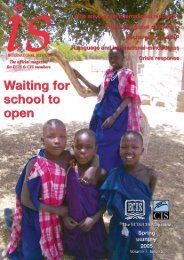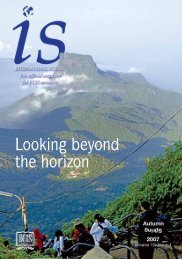is magazine 8.1 - Autumn/Spring 2005 - International Schools ...
is magazine 8.1 - Autumn/Spring 2005 - International Schools ...
is magazine 8.1 - Autumn/Spring 2005 - International Schools ...
Create successful ePaper yourself
Turn your PDF publications into a flip-book with our unique Google optimized e-Paper software.
Setting international standards for music<br />
Setting international<br />
standards for music<br />
Tim Arnold explains the advantages of graded exams<br />
Founded in 1889, The Associated Board of the Royal <strong>Schools</strong> of<br />
Music (ABRSM), based in London, England, <strong>is</strong> the world’s leading<br />
provider of music exams and assessments. Each year over<br />
630,000 young performers and singers take ABRSM music exams<br />
in more than 90 countries around the world. The exams are international<br />
benchmarks for the measurement of musical achievement<br />
– as are the professional music diplomas ABRSM also<br />
examines – for teachers, directors and performers around the<br />
world. The assessment process <strong>is</strong> always accompanied by the<br />
enjoyment of preparation, and indeed the phrase ‘enjoyment<br />
through achievement’ sums up ABRSM’s philosophy.<br />
ABRSM graded music exams are fully accredited by the UK’s<br />
Qualifications and Curriculum Authority; overseas, South Africa<br />
became, in May th<strong>is</strong> year, the latest in a number of countries to<br />
acknowledge the importance of ABRSM exams, by recogn<strong>is</strong>ing<br />
their equivalence to South African matriculation exams.<br />
Each year ABRSM sends many hundreds of examiners – fully<br />
trained, professional musicians, drawn from every branch of the<br />
music profession – to schools, colleges, teaching studios and private<br />
teaching practices across the world. One such exam centre <strong>is</strong><br />
Harrow <strong>International</strong> School in Bangkok, Thailand, where the<br />
Director of Music <strong>is</strong> David Gorodi. For him, ABRSM exams are<br />
internationally transferable music performance indicators; they<br />
are also an objective guide for teachers, a cons<strong>is</strong>tent method of<br />
assessing children’s musical performance, irrespective of global<br />
location.<br />
‘Working over the years with many music teachers from varied<br />
backgrounds has been a tremendous challenge. One piano<br />
teacher believed students should complete two years of music<br />
theory classes before being allowed to touch a piano, and another<br />
would not let h<strong>is</strong> students play a tune until they had mastered<br />
all their scales!<br />
‘However, having worked overseas for 18 years, in four very different<br />
international schools, I have found that the structure of<br />
ABRSM music exams helps guide teachers in their lessons,<br />
requiring them to vary repertoire and demanding attention to<br />
aural training and sight reading. The d<strong>is</strong>cipline of music exams<br />
also helps me monitor and encourage teachers’ progress.<br />
ABRSM has also provided an outstanding service, even in diffi-<br />
David Smith with pupils from<br />
the <strong>International</strong> School of Zug.<br />
cult circumstances – during terror<strong>is</strong>t threats in Saudi Arabia and<br />
flash floods in Spain, for example.<br />
‘As head of a music department ABRSM exams help me to provide<br />
a cons<strong>is</strong>tent standard of instrumental teaching in a wide<br />
variety of culturally diverse international schools.’<br />
Underpinning ABRSM’s growth <strong>is</strong> its support of music teachers in<br />
the increasingly pressured world of music education. Continuing<br />
professional development for instrumental and vocal teachers <strong>is</strong><br />
an important service provided by ABRSM, through a rich and<br />
varied programme of seminars, workshops and courses delivered<br />
each year throughout the world. For example, the Certificate of<br />
Teaching (CT ABRSM) course helps teachers to real<strong>is</strong>e their full<br />
potential and refresh their approach to teaching; widely recogn<strong>is</strong>ed<br />
and highly regarded by educational organ<strong>is</strong>ations worldwide,<br />
the course <strong>is</strong> currently available in Malaysia and Singapore,<br />
as well as the UK.<br />
New offerings are regularly added to the music assessments<br />
portfolio including, in recent years, jazz piano exams and jazz<br />
horns exams. Th<strong>is</strong> year ABRSM launched Music Medals, exciting<br />
new assessments designed specifically for pupils taught in groups<br />
(as opposed to individually taught pupils) who are at the early<br />
stages of instrumental learning.<br />
ABRSM believes it <strong>is</strong> important to be receptive to the needs<br />
and wants of teachers, pupils and their parents. ABRSM shares<br />
with ECIS a non-profit ethos, and the synergy goes further: both<br />
organ<strong>is</strong>ations have much in common, as seen in the ECIS<br />
Council’s m<strong>is</strong>sion statement to provide ‘services to support professional<br />
development, curriculum and instruction’. Despite the<br />
constantly evolving nature of international education, ABRSM’s<br />
aim <strong>is</strong> always to motivate music students to achieve the best they<br />
can.<br />
David Smith, Director of Music at the <strong>International</strong> School of<br />
Zug, Switzerland, summar<strong>is</strong>es the benefits of graded music exams:<br />
‘In our school, learning an orchestral instrument <strong>is</strong> a compulsory<br />
part of the music curriculum. For those students w<strong>is</strong>hing to take<br />
them, ABRSM exams have proved to be a wonderful way of supporting<br />
their learning. Most importantly, the exams are a great<br />
device for motivating all students, even those who find learning<br />
their instrument challenging.<br />
‘Without question, students pract<strong>is</strong>e more when they have a goal,<br />
such as a concert or exam, and these independent music assessments<br />
help enormously. ABRSM exams are incorporated naturally<br />
into regular lessons, but are not the main aim of the instrumental<br />
programme. However, we have found that music exams<br />
are an excellent way of assessing progress and provide a benchmark<br />
for students, teachers and parents alike. There <strong>is</strong> no doubt<br />
in my mind that our students are becoming better musicians and<br />
performers from taking part in ABRSM exams’.<br />
‘Setting the Standards’ has long been central to ABRSM’s work<br />
and it remains committed to learning and to supporting music<br />
education around the globe.<br />
Tim Arnold has wide experience as a music educator, performer,<br />
piano teacher and music examiner. In h<strong>is</strong> role as Head of <strong>International</strong><br />
Operations for ABRSM he also delivers professional development<br />
seminars for music teachers around the world.<br />
For further information please contact:<br />
<strong>International</strong> Department, The Associated Board of the Royal<br />
<strong>Schools</strong> of Music, 24 Portland Place, LondonW1B 1LU, UK.<br />
Telephone +44 20 7467 8240 Email international@abrsm.ac.uk<br />
12<strong>Spring</strong><br />
<strong>is</strong> <strong>Autumn</strong> <strong>2005</strong>




